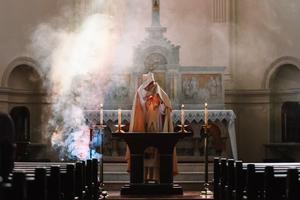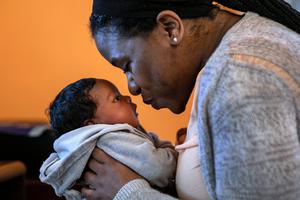Cardinal Dziwisz on St. John Paul II: ‘He Restored Dignity to Death’
The former longtime secretary recalls his friend and mentor on the 10th anniversary of his April 2 passing.

ROME — A once avid outdoorsman whose final years were marked by disability and suffering, St. John Paul II witnessed to what it truly means to die with dignity, says a close friend who was with him until the end.
“He gave us tranquility and peace even up to the last day,” Cardinal Stanislaw Dziwisz, who was present at the Polish pope’s death 10 years ago, told CNA in an interview.
“He restored dignity to death.”
Cardinal Dziwisz, the archbishop of Krakow, who at the time was serving as an aide to John Paul II, recalls singing the Te Deum (a prayer of praise to God) moments after the Pope died, because those in the room “were convinced that he had died a holy man.”
“A man prepares for a lifetime for this important moment, this passage from one life to another for the encounter with God,” he said.
John Paul II died at 9:37pm on April 2, 2005, the day before Divine Mercy Sunday — a feast he established during his pontificate — after a long battle with Parkinson’s disease.
Throughout his pontificate, Pope John Paul spoke out against what he referred to as the “culture of death,” which promotes ideologies such as abortion and euthanasia, and in turn championed for the promotion of human life and dignity.
Cardinal Dziwisz recalled the Pope’s last words to him before he died. “I kissed his hands and he told me, ‘Thank you’ and gave me his blessing,” he recounted.
He also remembered how John Paul II, while on his deathbed, asked those who had come to say their farewells to read the Gospel to him.
“Priests read nine chapters of the Gospel of John for the love of God, and so he prepared for his encounter,” the Polish cardinal said.
Over the course of John Paul II’s 27-year pontificate — one of the longest in Church history — he traveled to 129 countries and was instrumental in the fall of communism in Europe in the 1980s.
“He did not create resentment, but instead knocked down the walls between people,” Cardinal Dziwisz said, observing he had close friends who were Jews, Muslims and of other religions. “Everyone was important for him, because everyone was created in the image of God.”
The archbishop of Krakow also spoke of John Paul II’s strong sense of discipline throughout his life, which was always centered on prayer.
“He was a very disciplined man, from the point of view of moral ethics,” he said. “Even at work, he never wasted time. He always had time for prayer.”
In fact, for John Paul II, prayer was never separated from work, Cardinal Dziwisz said. “He was immersed in God; and in everything he did, he always walked with God and in prayer.”
“He always kept this intimate relationship with God, of contemplation, of contact with God, and here was his strength: peace of mind. God exists; God commands. God, we must follow him. If you follow God, you see peace, even in difficult times, which as pope, he had many.”
John Paul II was beatified by Pope Benedict XVI on May 1, Divine Mercy Sunday, at a ceremony which saw an estimated 2 million pilgrims flock to Rome. He was canonized April 27, 2014, in St. Peter’s Square by Pope Francis on the same feast day.
Cardinal Dziwisz touched on the impact that John Paul II’s being declared a saint had upon the faithful.
“I think people were convinced of his sanctity, that the supreme authority had approved the road of holiness, because we are sure that we could imitate his holiness.”
- Keywords:
- ann schneible
- cardinal stanislaw dziwisz
- communion of saints
- death and dying
- papacy
- pope st. john paul ii
















